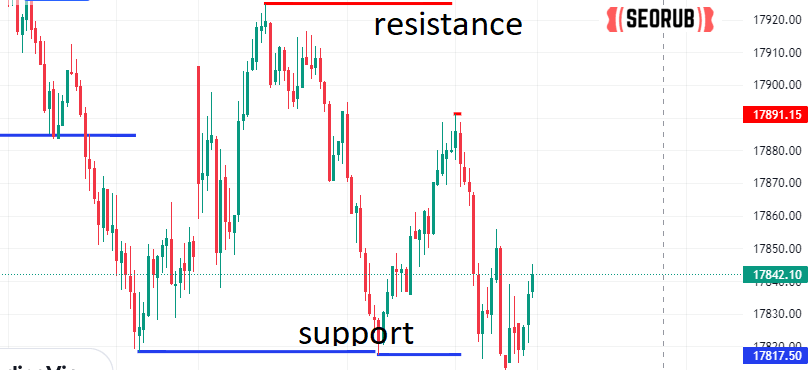What is the stock market?
The stock market is a place where shares of publicly-traded companies are bought and sold. Shares are small pieces of ownership in a company, and when you buy a share of stock, you are essentially becoming a part-owner of that company. The stock market is a way for companies to raise capital from investors, and it is also a way for investors to make money by buying and selling stocks.
The stock market can be a volatile place, and there is always the risk of losing money when investing in stocks. However, over the long term, stocks have historically outperformed other investments such as bonds and savings accounts.
If you are interested in learning more about the stock market, there are many resources available online and in libraries. You can also talk to a financial advisor to get personalized advice on how to invest in stocks.

How to trade stocks?
There are a few different ways to trade stocks. The most common way is to use a broker. A broker is a company that facilitates the buying and selling of stocks. You can find a list of brokers on the Securities and Exchange Commission (SEC) website.
Once you have chosen a broker, you will need to open an account. You will need to provide some personal information, such as your name, address, and Social Security number. You will also need to provide some financial information, such as your income and net worth.
Once your account is open, you can start trading stocks. You can do this by placing a buy order or a sell order. A buy order is an order to purchase a stock at a specific price. A sell order is an order to sell a stock at a specific price.
You can also trade stocks using a trading platform. A trading platform is a software program that allows you to trade stocks online. You can find a list of trading platforms on the SEC website.
Trading stocks can be a risky investment. There is always the possibility of losing money. However, if you do your research and understand the risks involved, you can potentially make money from stock trading.
V. Risks of stock trading
There are a number of risks associated with stock trading, including:
- Market risk: The value of your stocks can go down as well as up. This is because the stock market is volatile and can be affected by a number of factors, such as economic news, political events, and natural disasters.
- Liquidity risk: If you need to sell your stocks quickly, you may not be able to get the price you want. This is because the stock market is not always liquid, meaning that there may not be enough buyers for your stocks.
- Credit risk: If you buy stocks on margin, you are borrowing money from your broker to invest. This means that you are exposed to the risk of defaulting on your loan if the value of your stocks goes down.
- Fraud risk: There are a number of scams and frauds that can target stock traders. Be sure to do your research and only invest with reputable companies.
It is important to be aware of these risks before you start trading stocks. By understanding the risks, you can make informed decisions about your investments and minimize your potential losses.
VI. How to choose a stock broker?
When you are ready to start trading stocks, you will need to choose a stock broker. A stock broker is a company or individual that facilitates the buying and selling of stocks on behalf of their clients. There are a number of factors to consider when choosing a stock broker, including:
- Commissions: Stock brokers typically charge a commission for each trade that you make. The commission can be a flat fee, a percentage of the trade value, or a combination of the two.
- Minimum deposit: Some stock brokers require a minimum deposit before you can open an account. The minimum deposit can range from $0 to $25,000.
- Account types: Stock brokers offer a variety of account types, each with its own set of features and benefits. Some of the most common account types include:
- Cash accounts: Cash accounts allow you to buy and sell stocks with money that you have already deposited into your account.
- Margin accounts: Margin accounts allow you to borrow money from your broker to buy stocks. This can give you more buying power, but it also increases your risk of loss.
- Options accounts: Options accounts allow you to trade options, which are contracts that give you the right to buy or sell a stock at a certain price in the future.
- Research and trading tools: Stock brokers offer a variety of research and trading tools to help you make informed decisions about your investments. These tools can include:
- Stock quotes
- Charts
- News and analysis
- Brokerage research reports
- Customer service: Stock brokers offer a variety of customer service options, including phone support, email support, and online chat.
Once you have considered all of these factors, you can start to narrow down your choices of stock brokers. You can compare different brokers online or by talking to friends, family, or financial advisors. Once you have found a broker that you are comfortable with, you can open an account and start trading stocks.
How to research stocks?
Before you buy or sell a stock, it is important to do your research to make sure that you understand the company and its financials. Here are a few tips for researching stocks:
- Read the company’s annual report and 10-K filings. These documents will provide you with information on the company’s financial performance, management team, and business strategy.
- Follow the company on social media and read its news releases. This will help you stay up-to-date on the company’s latest news and announcements.
- Talk to your financial advisor or a stockbroker. They can provide you with insights into the company and its stock.
- Use online stock research tools. There are a number of online tools available that can help you research stocks, such as stock screeners, financial calculators, and charting tools.
By doing your research, you can increase your chances of making informed investment decisions.
How to Manage Your Risk?
When you’re trading stocks, it’s important to manage your risk so that you don’t lose more money than you can afford. Here are a few tips for managing your risk:
- Set a stop-loss order. A stop-loss order is a limit order that automatically sells your shares if they fall below a certain price. This can help you limit your losses if the market turns against you.
- Use diversification. Don’t put all of your eggs in one basket. By investing in a variety of stocks, you can reduce your risk of losing money if one stock performs poorly.
- Don’t trade on margin. Margin trading allows you to borrow money from your broker to buy more stocks. This can increase your profits, but it also increases your risk of losses.
- Don’t trade emotionally. When you’re trading stocks, it’s important to stay calm and rational. Don’t let your emotions get the best of you and make you make rash decisions.
By following these tips, you can help manage your risk and reduce the chances of losing money when you trade stocks.






